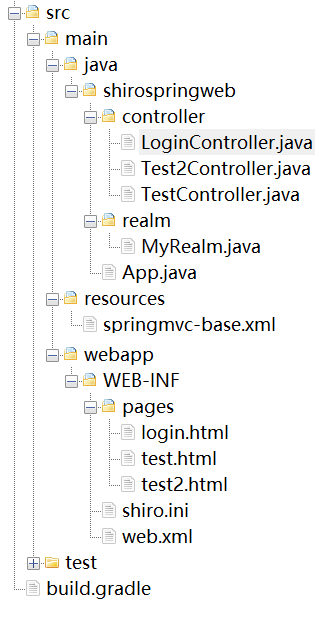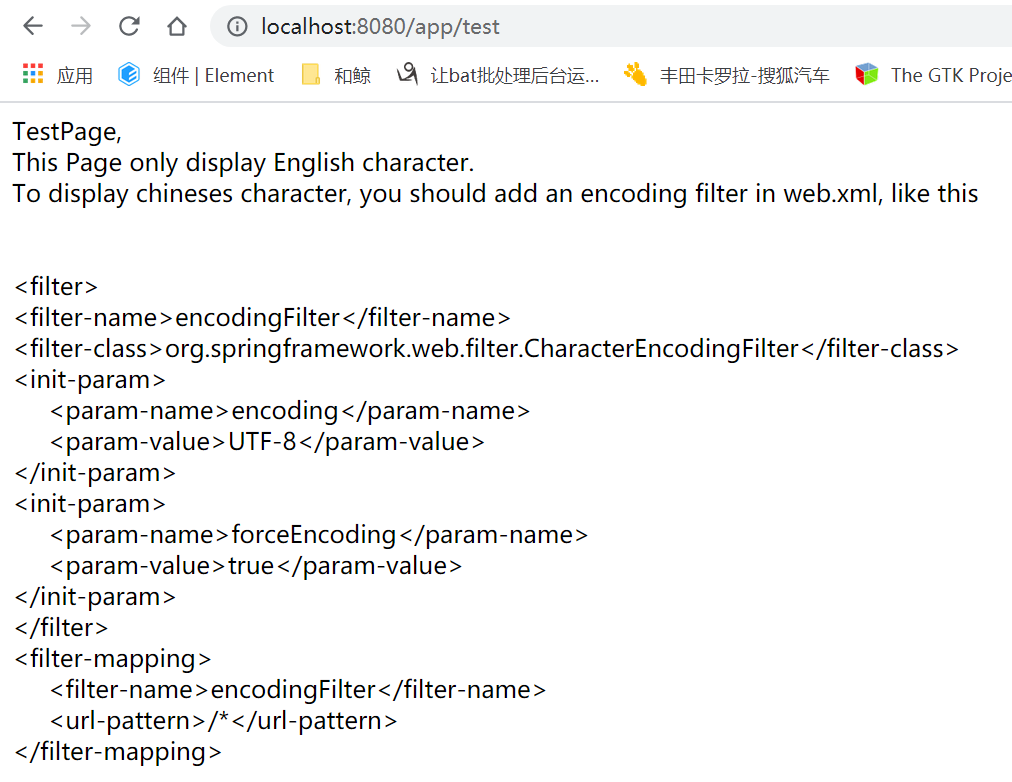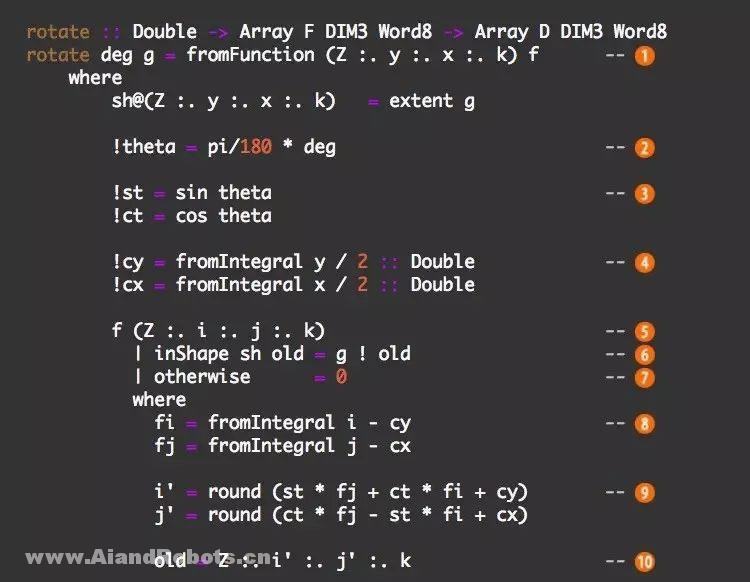简单的整合 shiro + SpringMVC 例子
简单的整合shiro和springmvc的例子
想要整合Shiro和springmvc,在网上找了很多例子,感觉都有一点复杂。所以就自己写了一个最简单整合项目,记录在这里以备后面查看。
这个例子包含如下三个部分:
1.简单的页面
2.shiro配置
3.springmvc配置
shiro可以直接和spring整合,但是这样需要单独配置spring用于整合shiro,在配置springmvc。配置文件看起来乱七八糟的。所以这里就shiro不采用spring来管理。因此这里的整合类似 shiro + servlet + springmvc。这样配置相对简单好理解。但也是最简单的配置,只能用于学习,用在实际项目中,还得改写。
下面是项目结构图(realm那个文件夹可有可没有,只是如果删除了,就需要将shiro.ini文件中 myrealm = shirospringweb.realm xxxx 那行删除掉)

下面是具体步骤
(1).添加依赖
既然是简单,那引用也是最少的,具体如下
dependencies {
// Use JUnit Jupiter for testing.
testImplementation "org.junit.jupiter:junit-jupiter:5.7.1"
// This dependency is used by the application.
implementation "com.google.guava:guava:30.1-jre"
// ++ Adding Spring dependencies
implementation "org.springframework:spring-context:5.3.9"
implementation "org.springframework:spring-webmvc:5.3.9"
// ++ Using Servlet for SpringMvc
implementation "javax.servlet:javax.servlet-api:4.0.1"
// ++ Using shiro-web
implementation "org.apache.shiro:shiro-web:1.7.1"
}其中前面两个是建立项目自带的,所以只需要引用后面的四个包就可以咯
(2).Servlet中配置Shiro
在servlet整合shiro,只需要在web.xml中引用shiro的上下文监听器(读取shiro配置文件),并配置shiro过滤器即可,具体如下:
<!-- Shiro直接拦截,不经过spring -->
<listener>
<listener-class>org.apache.shiro.web.env.EnvironmentLoaderListener</listener-class>
</listener>
<!-- 对应filter-->
<filter>
<filter-name>shiroFilter</filter-name>
<filter-class>org.apache.shiro.web.servlet.ShiroFilter</filter-class>
</filter>
<!-- filter Mapping-->
<filter-mapping>
<filter-name>shiroFilter</filter-name>
<url-pattern>/*</url-pattern>
</filter-mapping>在web.xml中配置好shiro后,需要在WEB-INF文件夹下书写shiro.ini的配置文件,具体如下
[main]
authc.loginUrl = /login
authc.usernameParam = username
authc.passwordParam = password
authc.successUrl = /
authc.failureKeyAttribute = shiroLoginFailure
logout.redirectUrl = /
myrealm = shirospringweb.realm.MyRealm
[users]
liang = 123, role1
wang = 123, role2
[urls]
/ = anon
/test = anon
/test2 = authc
/login = authc
/logout = logout
/** = anon这样shiro就可以配合servlet工作了
(3).配置springMVC
最简单springmvc的配置,只需要配置一个DispatcherServlet,并在其配置文件(resources/springmvc-base.xml)中打开包扫描,就好了,具体如下:
<!-- 配置SpringMVC -->
<servlet>
<servlet-name>springServlet</servlet-name>
<servlet-class>org.springframework.web.servlet.DispatcherServlet</servlet-class>
<init-param>
<param-name>contextConfigLocation</param-name>
<param-value>classpath:springmvc-base.xml</param-value>
</init-param>
</servlet>
<!-- 对应servlet mapping -->
<servlet-mapping>
<servlet-name>springServlet</servlet-name>
<url-pattern>/*</url-pattern>
</servlet-mapping>resources/springmvc-base.xml的配置文件如下(主要是打开包扫描和注解驱动):
<?xml version="1.0" encoding="utf-8"?>
<beans xmlns="http://www.springframework.org/schema/beans"
xmlns:xsi="http://www.w3.org/2001/XMLSchema-instance"
xmlns:context="http://www.springframework.org/schema/context"
xmlns:mvc="http://www.springframework.org/schema/mvc"
xmlns:aop="http://www.springframework.org/schema/aop"
xsi:schemaLocation="http://www.springframework.org/schema/beans http://www.springframework.org/schema/beans/spring-beans.xsd
http://www.springframework.org/schema/context http://www.springframework.org/schema/context/spring-context-4.1.xsd
http://www.springframework.org/schema/mvc http://www.springframework.org/schema/mvc/spring-mvc-4.1.xsd
http://www.springframework.org/schema/aop http://www.springframework.org/schema/aop/spring-aop.xsd">
<context:component-scan base-package="shirospringweb.controller"/>
<mvc:annotation-driven />
<!-- 用来处理当 DispatcherServlet 拦截全部请求的时候,它在RequestHandler处捡出静态资源的请求 -->
<mvc:default-servlet-handler />
</beans>然后书写上面shiro配置文件中的对应controller和前端页面就可以了。具体如下:
3.1 TestController 及其页面
TestController的代码,如下所示
package shirospringweb.controller;
import org.springframework.stereotype.Controller;
import org.springframework.web.bind.annotation.RequestMapping;
@Controller
public class TestController{
@RequestMapping("/test")
public String testPage(){
return "WEB-INF/pages/test.html";
}
}对应前端页面,如下所示(别看他挺多的样子其实啥也没有,这里主要是将了一个在springmvc页面中也是中文的配置,可以当做没看见)
<html>
<head>
<title>TestPage</title>
</head>
<body>
TestPage,
<br/>
This Page only display English character.
<br />
To display chineses character, you should add an encoding filter in web.xml, like this
<br />
<br />
<br />
<filter><br />
<filter-name>encodingFilter</filter-name><br />
<filter-class>org.springframework.web.filter.CharacterEncodingFilter</filter-class><br />
<init-param><br />
<param-name>encoding</param-name><br />
<param-value>UTF-8</param-value><br />
</init-param><br />
<init-param><br />
<param-name>forceEncoding</param-name><br />
<param-value>true</param-value><br />
</init-param><br />
</filter><br />
<filter-mapping><br />
<filter-name>encodingFilter</filter-name><br />
<url-pattern>/*</url-pattern><br />
</filter-mapping><br />
</body>
</html>3.2 Test2Controller 及其页面
Test2Controller的代码
package shirospringweb.controller;
import org.springframework.stereotype.Controller;
import org.springframework.web.bind.annotation.RequestMapping;
@Controller
public class Test2Controller {
@RequestMapping("/test2")
public String getTest2Page(){
return "WEB-INF/pages/test2.html";
}
}其对应的界面如下:
<html>
<head>
Test 2 Page
</head>
<body>
This is the test 2 page <br/>
(Can not display chinese Character, more information <a href="/app/test">click here</a>)
</body>
</html>3.3 LoginController 及其对应的界面
LoginController的代码
package shirospringweb.controller;
import org.springframework.stereotype.Controller;
import org.springframework.web.bind.annotation.RequestMapping;
@Controller
public class LoginController {
@RequestMapping("/login")
public String getLogin(){
return "WEB-INF/pages/login.html";
}
}其对应的登录界面
<html>
<head>Login Page</head>
<body>
This is Login Page With No Chinese Character
<br>
<form action="/app/login" method="POST">
username : <input name="username" /><br/>
password : <input name="password" /><br/>
<input type="submit" value="LOGIN"/>
</form>
</body>
</html>好了,代码到这儿完事儿了,下面是运行的效果图
(4).运行效果
4.1 首先访问/app/test页面可以访问到(shiro未拦截)
页面如下

4.2 其实访问/app/test2需要登录,登录后需要后跳转(可能需要访问两次,有一次请求URL会带参数,这个shiro会报错,这是shiro的问题,可以百度解决)具体如下:

登录后跳转

访问/logout会退出到主页面,这个就不截图了
结束了


